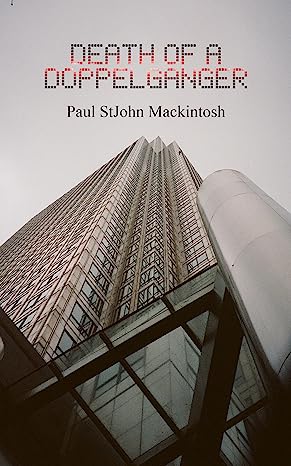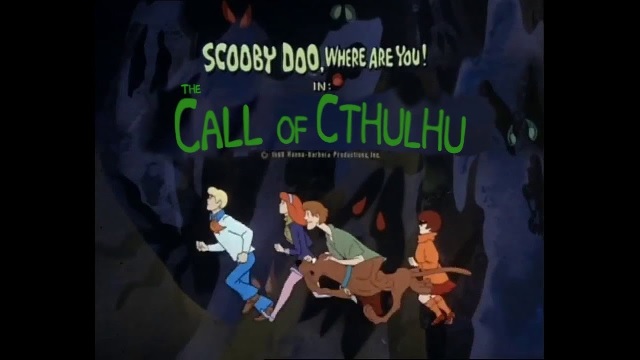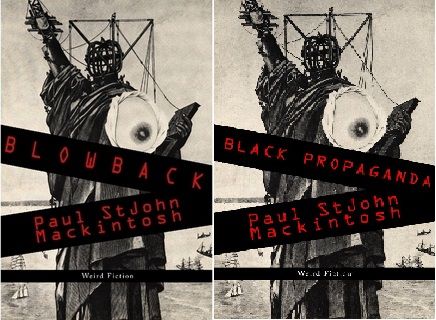Latest novel published! Death of a Doppelgänger

My publisher has just published my latest novel, Death of a Doppelgänger , a psychological thriller and coming-of-age story loosely based on my time at Cambridge in the 1980s. Enjoy!
“It Was Me All Along!”: Cosmic Horror and Mythos Fan Service

Here’s some thoughts that I had lately about scenario design for cosmic horror roleplaying. Specifically, here’s three outlines of three contrasting horror RPG scenario formats – in principle for Call of Cthulhu 7th Edition, but just as applicable to other Cthulhu Mythos games. The first scenario type kicks off with an initiating event that has very strong Mythos hallmarks. The investigators may or may not know about the Mythos, but they discover more and more about it as they progress. They find traditional myths or historical events in the archives that suggest something of the nature of the Mythos. They encounter relics or mementos of Mythos cults or entities. They find Mythos tomes giving some indication of the type of threat they face and the potential dangers to humanity – as well as possible resources to counter it. They tackle lesser Mythos antagonists that have some fairly credible relationship to the ultimate threat. Finally, they face the ultimate nemesis, which has a suitably unpleasant goal in mind, and defeat it (or not) with the resources they have on hand, or have acquired through the adventure. The complete dimensions of the threats and the challenge have been communicated entirely by the discoveries made by the investigators within the scenario.
In the second scenario type, a bizarre initiating event kicks off an investigation with no apparent logical explanation whatsoever. It may have some strange symbolic resonances but no obvious meaning or point. The investigators start to inquire and are repeatedly baffled. Incomprehensible unnatural events befall them. Strange threats menace them with impossible and inexplicable dangers. These risks and puzzles may have some affinity or common thread with the initiating event or not. Any recorded myths or apparent explanations relating to the events are cryptic and elusive, with no underlying common logic. The investigators may acquire some kind of inkling about how to deal with the apparent gathering menace, perhaps through some imaginative correspondence or other dream-like revelation, but hardly through any process of rational deduction. Finally, they confront the ultimate enigma and vanquish and dispel it (or not), but in any case receive no further clarification about its meaning. There may be very resonant tropes tying all of the elements in the scenario together, but there is no underlying logic that the investigators could ever unravel.
The third scenario type kicks off with an initiating event bearing all the hallmarks of traditional occultism or mythology, and very possibly taking place in a traditional occult or mythological context. All the tropes and set-dressing for the unfolding investigation are redolent of traditional occult lore. The investigators encounter occultists practising traditional occult practices. They experience phenomena and upsets in line with traditional magical and spiritualist beliefs. They uncover traditional occult tomes and grimoires. They encounter lesser threats and dangers completely consistent with traditional occultism and mythology. They may even learn traditional occult spells, and solve puzzles based on traditional magical lore. Finally, they confront the main threat or nemesis, in a denouement totally explicable within the terms of traditional occultism, and defeat it – or fail to defeat it – on those terms, using whatever traditional occult resources and resolutions they may have. Only then does the GM pull back the curtain and finally reveal that the whole setting was Cthulhu Mythos all along, and the key antagonists were actually Mythos entities masquerading as the products of primitive superstition, often avatars of Nyarlathotep. This revelation takes place in the form either of a concluding event that has no obvious organic relationship to the rest of the scenario, or a big data dump, or a combination of both.
It should be obvious what my preferences are out of those three. For anyone puzzling over what might be an example of the second, I’d suggest the classic Delta Green scenario “The Night Floors” – or as someone suggested, much of David Lynch’s output. One of the beauties of the whole Yellow King fork of the Mythos is that there’s never any real explanation of what agenda the King or the court of Carcosa have. They’re not there to wrench the Earth back into another dimension or restore the dominion of the Great Old Ones: they just infect the environment with inexplicable awfulness. Meanwhile, players may or may not find the second structure more intriguing than the first scenario outline, but I don’t think that any players wanting to play a Call of Cthulhu game could object to that first scenario structure. Above all, that delivers Mythos from start to finish, not requiring any player game-world meta-knowledge to up the fear factor or attempt to justify the goings-on, since all the explanation and justification is internal and unfolds from the scenario itself.
That does kind of raise the question of how much Lovecraftian horror is actually cosmic horror in the sense of inexplicable. (Kyle Maxwell recently wrote an interesting post about this.) For a writer with a reputation for hinting at the indescribable with vaguely allusive purple prose, H.P. Lovecraft actually delivered a shedload of detailed explanations in his horror, and I don’t think it suffers as a result at all. In “At the Mountains of Madness,” data delivery almost reaches ludicrous extents, when the explorers gain insights into the history of the Elder Things from their wall art, to a fairly unbelievable level of historical detail. But does the minute anatomical detail of the description of the Elder Things detract from the marvellously suggestive horror of the massacre at Lake’s camp? I don’t think so. Above all, the basic point is that the story gives a full, detailed, rational explanation of itself within itself. There’s some lovely cryptic allusions at the end to something further inexplicable and quite beyond, but those are more like a suggestive coda, keeping open the air of inexplicable wonder. What has really blown the explorers’ and presumably the reader’s minds, meanwhile, is the revelation of historical deep time, and the insignificance of puny humanity in that context. “The Shadow out of Time” hits many of the same notes. And in “The Dunwich Horror,” for instance, we’re left in no doubt of exactly what the Whateleys are up to and what their objective is. There’s an investigation, an uncovering of facts, and a resolution based on those facts – especially since the facts revealed in the Whateley journal and the Necronomicon are exactly what allow the Armitage party to vanquish the last monstrous Whateley.
I’m not trying to detract from Lovecraft’s power to suggest the genuinely inexplicable and incomprehensible, or just to scare people even when he structures a story on a solid investigative footing. There may be plenty of other writers past and present who have gone one step beyond Lovecraft in taking him at his word when he talks about the enigmatic and unfathomable, and actually have actually crafted effective mysteries that have no rational resolution, merely suggestive outcomes often poetically pointing towards the incapacity of the human mind to actually understand and embrace the ultimate nature of reality, or even just what’s going on at the time. I’m very familiar with the Forbidden Planet argument that the invisible monster which people fill in with their imaginations is far more frightening than the visible creation of a special effects budget. Some aficionados may regard this second scenario structure as the more truly cosmic horror, but I don’t think Lovecraft can be faulted for not going all the way to the complete artistic conclusion of his premises.
But the third type of scenario in particular raises a question that I’ve bumped up against while listening to live play after live play of Mythos investigative scenarios with similar endings. Those endings usually consist of the players asking what really happened in the scenario, and the GM giving a long retrospective explanation, frequently with one of the antagonists really being an avatar of Nyarlathotep. Why shouldn’t the investigators actually uncover what’s going on themselves as they actually play the game? Why shouldn’t those bizarre and very juicy Mythos tropes be inserted into the materials that are being uncovered, and point a way towards some kind of potential conclusion or resolution of events that leans on the Mythos? Why should genuinely inexplicable events have to be justified by reference to Lovecraftian tropes, if those aren’t included as an organic part of the scenario itself? What kind of satisfaction are players going to get from a deeper level of meaning if this is only revealed at the very end and does not integrate into the actual play? And as a related point, why should scenarios structured around non-Mythos settings and tropes be hauled back to the Mythos at the very last minute? If that hasn’t organically been part of the scenario from the very start and disclosed in the course of play, what use is it? Doesn’t this bait-and-switch approach leave players feeling rather mystified, disempowered and cheated?
Look at “The Derbyshire Horror” in Masks of Nyarlathotep. Are the players supposed to be led into the scenario believing in werewolves as a potential real thing in the game world? Or are the characters supposed to believe that werewolves could be real – as real as all the other supernatural things they’ve already encountered – while the players go along with the in-joke because they know that Lovecraftian ghouls are “real” but werewolves are just superstition? If the characters don’t have sufficient Cthulhu Mythos skill, why should they know anything about Lovecraftian ghoul lore? For that matter, ghouls are as much a part of traditional Middle Eastern and eventually Western mythology as werewolves (remember that great 1975 Peter Cushing film The Ghoul?), so why should there be a big meta reveal around the fact that Eloise Vane is a Lovecraftian ghoul and not a werewolf? The whole mistaken identity theme could have been worked within traditional folklore without touching on the Mythos at all, even down to fooling around with silver bullets that have no special efficacy.
I don’t get the impression that Chaosium ever required or expected that all products released for Call of Cthulhu should necessarily include Cthulhu Mythos elements. Look at the scenario collection Blood Brothers. Look at “The Haunting,” that classic introductory scenario, which has spooked generations of players without having much overt and obvious connection to the Mythos at all. Advice to Keepers for “The Haunting” specifically states that: “The Liber Ivonis is not central to play, and can be excluded if the Keeper is unready to introduce the Mythos or a Mythos book.” Look at the brilliantly successful Berlin: The Wicked City, whose antagonists and dark forces have only the most peripheral relation to the Mythos. Look at that modern classic The Children of Fear, where Lynne Hardy drops in brief Mythos-related framing material for those who need it at the start of the massive campaign, before unfolding the adventure almost entirely along the lines of Theosophist occultism and traditional tantric beliefs. The world almost comes to an end in that brilliant saga in a thoroughly un-Mythos way. Again, this isn’t to carp at those who do write solid Mythos scenarios – it’s just to point out that no one including Chaosium apparently ever thought that the Mythos was compulsory for the game.
And as for writing the third type of scenario because Mythos deities and entities are more “real” than other mythologies and occult traditions…? Well, it’s an assumption that can be used and mined for its potential value within the game world. But coming to the game setting from the outside as a game setting among other game settings? Accepting that all human mythology, pantheons, supernatural entities etc. are nothing but an appendage to the writings of one weird fiction author in the 1920s and 30s? That’s the kind of fan service that strikes me as doing a big disservice to Lovecraftian fiction and everything else that isn’t cosmic horror. Keziah Mason is a witch who casts spells. Joseph Curwen is a resurrected member of the undead who sucks blood. It’s all equally supernatural fiction and fantasy. There are lots of interesting debates to be had about the position of Lovecraftian and cosmic horror versus the types of supernatural horror that preceded it, but in game terms, they’re all equally fictional alternative game settings, that’s all.
I do think, in short, that there’s a risk of Mythos fan service upsetting otherwise great scenarios, and leading scenario writers astray. I don’t believe that an end-game data dump constitutes a great roleplaying exploration of the Mythos. I do believe that you can have a very frightening and enjoyable scenario that does explain and resolve itself on its own terms as it unfolds, without having to lean on any external layer to provide the actual framework and context. As said, I also believe that it’s possible to have a satisfying gaming experience that is based on the completely inexplicable – but that is a totally different thing from having a meta explanation and refusing to give it until the last second, often after actual gameplay has ceased. There’s a world of difference between a last-minute twist, or the classic horror movie jumpscare where the vanquished horror springs back to life, and a data dump. I suspect that some writers who feel tempted to head in that direction are simply looking to, or feel obliged to, pay fan service, concerned that their scenario will not be accepted in the canon unless it has some kind of Mythos reference within it.
I do think Call of Cthulhu is a great horror game and I don’t see why its scenario writers should feel it needs to be shackled to Strictly Mythos – Chaosium obviously didn’t. And above all I’d just like to see more scenarios written as internally consistent and complete. If you’re going to do a Mythos scenario, then why not do it as one where the Mythos is there full face, up on its hind legs and howling? I have the strong impression that, despite the reams of scenarios published, there are still areas of the Mythos that are way underexploited and underused. How many great campaigns or scenarios have we had about L’mur-Kathulos, Bran, and the Magnum Innominandum? Why should the scenario writer just have the Mythos show up just as an apologetic afterthought? It’s knowledge, not incomprehension, that hauls us off our placid island of ignorance. It’s the terrifying vistas of reality, and our frightful position therein, that drive us mad, and those can be explained and described, as well as just glimpsed or hinted at. That’s what Lovecraft actually did almost every time.
I rather feel that investigative horror gaming works best as horror revealed by gaming the investigation, not horror given a last-minute tail-end boost by pinning on a load of extraneous material. Fine, there may be a good case for the third style of scenario, but at least I think that reason should be a genuine and conscious attempt to create gaming fun through a solid gaming moment. And I appreciate that this whole screed may have come across as very one-true-wayist, but I do think the underlying point is worth drawing attention to.
[Top]Living through SARS

The first inkling I had that the SARS outbreak in Hong Kong in March 2003 was serious was when my colleague turned up to work wearing a heavy filter mask. It wasn’t the discreet courtesy paper rectangle: it was a respirator-style cone with two great round filters on either side. She wore it the entire time as she sat at her desk, lifting it only to eat from her lunchbox.
My first reaction was anger. Here we were, working as a team, supporting each other, exposed to the same work environment, taking the same knocks, sharing the same risks and rewards in our Hong Kong PR agency, and yet here she was treating the rest of us as plague carriers. How could she break the team spirit? The only exoneration I could think of was parental pressure. Like most younger Hong Kongers, she probably lived with her family, forced to share living space by the high property prices. With typical Cantonese family sense, they doubtless had put pressure on her to keep contamination out of the home and screen out the threat from the Outside. That rationale eased my anger only a little.
I had nothing much to leave Hong Kong for in 2003, and by the time I finally realized how serious the situation was, I had lost the opportunity. SARS never quite made it into the pandemic league, since it never spread far enough. Only a score of countries were affected, and the majority of the 8,098 reported cases were in southern China. Still, it caused worldwide panic, and its prognosis was considerably grimmer than coronavirus: an average fatality rate of 9.5% of those infected, compared to at most 3.4% for COVID-19. Left unchecked, it could have killed 670,000 people in Hong Kong alone. And Hong Kong, one of the most densely populated territories anywhere at 6,659 people per square kilometer, was isolated from the rest of the world in 2003 and left to deal with SARS by itself.
Spring in Hong Kong is a humid season, and March 2003 was no exception. With its high population density and inward-looking character, Hong Kong is a claustrophobic environment at the best of times, fomenting cabin fever besides other contagious diseases. The thick low clouds hanging over the city added to the impression of a seething cauldron with the lid crammed down. Already it was effectively impossible to leave the city by any ordinary means. The World Health Organization issued an emergency travel advisory on 15 March, providing “emergency guidance for travellers and airlines.” Many countries were by that time already restricting or refusing to admit flights or passenger traffic from Hong Kong, and the WHO advisory signalled an effective global cordon sanitaire. No one could get out.
Isolation was the strongest and most immediate impression of the outbreak. The sense of imprisonment was as oppressive as the creeping dread of the disease itself. The SARs virus, of course, was invisible, and actual cases were rapidly quarantined. News reports only added to the surreal air of a nightmare you couldn’t waken from. The WHO continued “to recommend no travel restrictions to any destination,” and governments worldwide insisted that there would be no embargo of Hong Kong – while cutting flights, denying entry, and instituting a de facto embargo of ferocious comprehensiveness. Their efficiency contrasted with the Chinese authorities – hustling SARS patients out the back of hospitals when the WHO inspectors came calling, to bring the headline case numbers down. China’s venal autocracy had let the disease get out of hand in the first place, and we knew we could trust nothing that came over the border. The official lies, evasions and half-truths added to the all-pervading sense of unreality. Hong Kong resembled a ghost town, populated by phantoms. Streets were almost empty except for occasional wraithlike figures in masks. Mists and fogs worthy of any Hammer horror film clung to the peaks.
In the circumstances, we knuckled down and rode it out. We simply had no choice but to get on with stuff. We couldn’t get away, and we couldn’t be terrified 24:7. Fortitude came easy in those conditions. Offices stayed open, and work went on, though with precautions. There was never the draconian response in Singapore, where all quarantine cases were required to have a webcam connected at all times and faced random government checks to verify their presence at home, as well as to check and record their temperatures twice daily on camera if required. We went out, we drank, we partied, we went clubbing, because when we were already so much at risk, what did a little more matter? It was defiance, giving the finger to the rest of the world that had conspired, without a formal coordinated policy, to trap us there.
Besides, if we thought we had it bad, there was always someone worse off to compare with – like the residents of Amoy Gardens, the outbreak’s worst hotspot, confined within their apartment buildings behind police cordons while tenant after tenant became infected. As streetwise Hong Kongers, we naturally assumed that the cause lay in shoddy building work by the developer and poor safety standards. Sure enough, most of the contagion was traced to leaking waste pipes spraying waste water into the complex’s breathing air, but not before over 320 people had been infected. In April, the residents were transferred to quarantine camps in remote districts.
Then there were the doctors, nurses and healthcare workers, always the frontline casualties in any battle against disease. You can still see in Hong Kong Park above the harbour a poignant memorial to eight doctors, nurses, and ward attendants who died from the disease while fighting its spread. They were the community’s local heroes, in contrast to the leadership, disdained at the best of times.
Quarantine, like war, is months of boredom punctuated by moments of extreme terror. Add to that frustration. Much of our pushback against the official guidance on self-seclusion in Hong Kong during SARS was pure frustration, rather than deliberately flouting authority. In any event, we had plenty of time to build up a hell of a head of frustration. On 23 May, the WHO lifted its Tourism Warning for Hong Kong and Guangdong, and the moment the informal blockade was lifted, I was on my way to Singapore.
That was our limited little plague over. Hong Kong’s final toll was 1,755 confirmed cases and 299 deaths from SARS. Samples of the SARS virus are still among the few classified as Biosafety level 4 organisms by the US Department of Health and Human Services (HHS), alongside the Ebola and Marburg viruses and ricin.
What were my takeaways from SARS for the coronavirus pandemic? National sovereignty is a great way of ducking your wider responsibilities: that was one. The Communist Party of China can never be trusted to put the lives of its own citizens or the wider global community before its own monopoly on power: that was another. But if I learned any personal lesson from the experience, it was the value of patience. Any courage we showed under SARS was obligatory. We had no choice. We weren’t going anywhere. We had no agency, no power to alleviate the situation. We just had to get through it.
In a society powered by instant gratification, patience and forbearance are habits that take some reacquiring. We’re told constantly that our slightest twinge is worthy of attention, that we’re entitled to have our most insignificant discomforts and discontents pandered to. We confuse our entitlements with our rights. We feel entitled to have our fears pandered to instantly, as with our desires. SARS at least put that in perspective. It helped immunize me against fear. Now at least I’ve been through it and come out the other side. So, hopefully, will most of us
[Top]Why I titled my book “Black Propaganda” – and why I retitled the ebook “Blowback”
 Because Black Lives Matter. That’s the short answer. The longer one needs more explanation – of my first choice of title, my second, and why I made the change.
Because Black Lives Matter. That’s the short answer. The longer one needs more explanation – of my first choice of title, my second, and why I made the change.
Last item first. It wasn’t about kneejerk political correctness. If I was that concerned about dogmatic PC, I wouldn’t have been writing about hardcore dominance and submission, human trafficking, and human sacrifice in the first place. I first came up with the title around 2014, in Budapest, when I started putting my dark and weird short and (nominally) erotic fiction together on a plan dating back to 2012. I went with it till early 2016, when I worked out the cover design and jacket image with my (Danish) publisher. I liked the cover so much that I put it out on Facebook for the horror/dark/weird fiction community. I had plenty of positive feedback, and no cautions or criticisms. I liked it so much that I made a t-shirt out of it. Then I looked at the design, and thought again. I asked some members of the same community whether they thought anyone would object to the title or cover design in the context of Black Lives Matter. They said no one in the horror/dark/weird community would notice or mind. I asked: what if I wore it as a t-shirt? Pause. Then: Better not do that. I tried the same test with a bunch of US media/journalism academics at the Central European University in Budapest. Same reaction.
I wouldn’t presume to speak for Black Lives Matter. There are others far better positioned to do that than me, from a far more informed and involved point of view. This time at least, I have to talk about me. And inadvertently, I had ended up with something that could, at a glance, or through a casual misreading, be seen as endorsing the Fox News/Bill O’Reilly/All Lives Matter bleating and barracking of the movement. A casual misreading as in, passing on the street, on a t-shirt. And if you can’t wear your slogan, on the street on a t-shirt, there is a problem with your slogan, no?
I couldn’t claim to be unaware of the issue, from the moment I first realized this. Way back when I was first mulling over titles, in Hungary, perhaps. But certainly not now. So I had to take a position on it. Practically, if I just wasn’t able to change the title, I would have to live with it. But the space between print book and e-book edition gave me some room for reflection. And the original print edition with its original title is still there, lest anyone suspect me of trying to (ahem…) whitewash myself, and airbrush out my past choices. But if I didn’t at least try to make a change, to my mind, I would be either indifferent to the Black Lives Matter movement … or worse. In any case, not acknowledging it. And even within the dark/weird/SF/horror fiction community, after recent debates on inclusion, H.P Lovecraft’s bust in the World Fantasy Awards, the Rabid Puppies assault on the Hugo Awards, etc. such choices do have resonance.
This is not a neutral context, if it ever was, and it is a space where I could make a public choice. A relatively small, insignificant space, fine, free from harm or consequences beyond a few sales gained or lost – but my own space, the one involving and implicating me, where I got to exercise personal responsibility. My space to make authentic choices, as author, not bandwagon-jumper or well-wisher; choices that directly impacted me, with implications for my own writing career; choices that put my skin in the game, however trivially, and allowed me to take a stand and do the right thing.
I also anticipated that some critics, on all sides, might accuse me of selfish opportunism, currying favour with a fashionable group for self-promotion and audience share, parlaying the suffering of others into a bigger readership with zero personal pain. Yes, I did think about market, and audience. But that kind of priority surely also acknowledges that Black Lives Matter. Black readers matter. Their opinion, their spend, their sensitivities, their economic as well as their political and moral power, matter. If you literally cannot afford to be indifferent to them, then that is exactly how things should be.
So why did I choose “Black Propaganda” as the title in the first place? First off, because partners and other members of the BDSM community were regularly referring to my sexuality as “dark” – and the stories in the book all ultimately stemmed from my own sexuality, as an exponent of the BDSM lifestyle. And of course, to evoke Fifty Shades of Youknowwhat. And because the collection is dark fiction. But I took the term itself from psychological warfare terminology, because it suggested exactly the kind of self-questioning, self-subverting, backbiting, reciprocal, ironic, self-interrogation that I wanted for the book’s focus on BDSM-style dominance and submission – a title that questions its own premises and implies that it may be the direct opposite of what it appears to be on the surface. Because of the mutual dependency, the interdependence, the sharing, that lies at the root of consensual power exchange and BDSM. Also because of “propaganda” in the original Roman Catholic sense – propagation of a dogma, in this case the dogma of dominance and submission. With again, the implication that this is a creed whose practice absolutely contradicts its explicit premises.
And why “Blowback”? Because it has a similar pedigree in psywarops terminology, and also describes something that rebounds on and undercuts its explicit purpose. And an obvious sexual implication. And also because it describes pretty much what happened to my first choice of title – unintended or unforeseen consequences. In fact, the new title fits the book so well that I don’t even need to change a single line of the original foreword to accommodate it. And that also reflects how any book is in a state of evolving, even reactive dialogue with its audience.
Except that part of that audience is literally in the firing line. Facing military grade firepower, or insanely empowered itchy-finger vigilantism. Facing plenty more besides, and elsewhere, certainly, but let’s focus on that one, uniquely American, thing that started this whole movement off in the first place. Dickens may have protested (quietly) against slavery in America in the 1840s; Einstein may have protested far more vociferously against segregation in the 1920s and 30s: neither was directly protesting against summary, serial, judicially sanctioned, public execution on suspicion, on the streets, without trial. Post Civil Rights. In a notionally free, fair and democratic country. To riff off Joss Whedon’s remarks when asked why he writes strong female characters: Black Lives Matter. Because what’s the alternative?
(If you’re interested in the actual book, the paperback version, Black Propaganda, is here. The ebook version, Blowback, is here – at least until it gets onto the Kindle Store.)
[Top]A new style for a new time
Turned out the first restyle of my site since for ever, to turn it into less of a blog and more of a personal home page. I do most of my web writing on Facebook or Twitter or TeleRead anyway. Not the most Gothic format, but working on that. Happy with it anyway.
[Top]The next war has already begun

One hundred years ago today, Europe went to war. A century later, Europe is at war again. The only question is how limited or how general, how cold or how hot. There’s no question about when: it has already started. Flight MH17 was the Lusitania of our time: a neutral passenger carrier blown up without warning in neutral space. European casualties have fallen on European soil (from a height). Nations went to war for far less in 1914. And appeasement is useless when the missiles are already flying.
I have two young half-Hungarian daughters. I don’t want them to become victims of this war like so many of their forebears were of the last. Therefore, I’d rather not hide my head in the sand or leave anyone else the luxury of doing so.
War will continue because Putin and his clique simply do not want peace. It doesn’t serve their political or their ideological interests. Autocracy requires it. Autocracy depends on it. Already Russian Facebook buddies are sharing stirring pictures of the Russian military in training which could have been taken straight from Nazi propaganda of the Thirties. Already we have tinpot authoritarians like Viktor Orban grooming themselves to be the new Quislings of a putative Russian Reich. And already we have useful idiots like the current French establishment trying to indulge their pompier fantasies of independence in the middle ground, in a polarized world where autonomy at the national level will be as fraudulent as Russia’s mini-statelets.
Sadly, Europe’s ailing democracies will probably need a few more lessons in threat management before they are really ready to face up to what is going on. European political establishments are Marshal Plan babies, whose diplomatic and strategic skills have withered under American protection, even if they ever could have supported much of an effort by themselves in the era of the Superpowers. And their resolve and commitment is fatally sapped by an era where they relied on the premise that freedom was about wealth. Having sold that to their electorates for generations, they are sadly inept and late to the game when it comes to rediscovering what freedom is really about.
However, they will probably not be given too much chance to disgrace themselves because the issues are so stark. There is no accommodation simply because, Russia and Israel are both demonstrating beautifully that anti-democratic governments need to shoot other people in order to stay in power. War is what props them up. And yes, Russia could develop a perverse self-interest in a Europe on a permanent cold war footing, since this would justify the autocracy staying in power, just as it did previously. Business could be done under those conditions – but with a very long spoon. And as for Russia’s liberals and more pacific elements, they may be casualties of history and their own heritage, but that is no reason to add the rest of Europe to the casualty list.
Containment is workable. It kept the peace in Europe for almost 50 years post the last war. Maybe it can keep this one within bounds too. If it has to be a permanent cold war, fine: it will be. And as for peace? An awful lot of reality is going to have to dawn for that to happen.
[Top]
